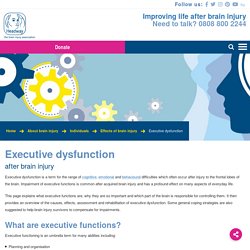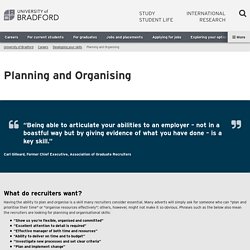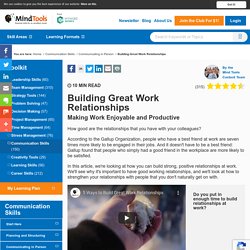

Application forms Feb 2020. Interview Techniques Feb 2015. Salter Mandy 2020 Job Description.
Executive dysfunction. Executive dysfunction is a term for the range of cognitive, emotional and behavioural difficulties which often occur after injury to the frontal lobes of the brain.

Impairment of executive functions is common after acquired brain injury and has a profound effect on many aspects of everyday life. This page explains what executive functions are, why they are so important and which part of the brain is responsible for controlling them. It then provides an overview of the causes, effects, assessment and rehabilitation of executive dysfunction. Some general coping strategies are also suggested to help brain injury survivors to compensate for impairments. What are executive functions? Executive functioning is an umbrella term for many abilities including: Most of us take these abilities for granted and we effortlessly perform extremely complex tasks all the time in our everyday lives.
Motivation - Wanting to make a nice meal and making the decision to start doing it. Poor problem solving. Planning and Organising - University of Bradford. Here’s an example: Define the SITUATION: Last summer I spent five weeks travelling around Europe with three friends.

We started to plan the trip before our examinations so we would have something to look forward to. Identify the TASK We wanted to see as many European capitals as we could and I was given the task of planning the itinerary and budget. Describe the ACTION you took As our holiday got nearer, we realised that we wouldn’t have as much money as we thought! Highlight the RESULT you achieved Even though the trains weren’t always on time, and we were often sleep deprived, we had a great time.
Salter Mandy 2019 Planning and Organising 2019. SACU Login - United Kingdom.
How to Choose the Right Career (with Pictures) This article was co-authored by Meredith Walters, MBA.

Meredith Walters is a Certified Career Coach who helps people develop the skills they need to find meaningful, fulfilling work. Meredith has over eight years of career and life coaching experience, including conducting training at Emory University's Goizueta School of Business and the US Peace Corps. She is a former Member of the Board of Directors of ICF-Georgia. She earned her coaching credentials from New Ventures West and a Master of Business Administration from the University of San Francisco. Categories: Career Planning. Job descriptions: A to Z of careers: types of job. Explore careers. Easing Back into the Work Force After a Brain Injury. Careers Guidance 04.02.19. Building Good Work Relationships. How good are the relationships that you have with your colleagues?

According to the Gallup Organization, people who have a best friend at work are seven times more likely to be engaged in their jobs. And it doesn't have to be a best friend: Gallup found that people who simply had a good friend in the workplace are more likely to be satisfied. In this article, we're looking at how you can build strong, positive relationships at work. We'll see why it's important to have good working relationships, and we'll look at how to strengthen your relationships with people that you don't naturally get on with. Do you put in enough time to build relationships at work? Why Have Good Relationships? Human beings are naturally social creatures – we crave friendship and positive interactions, just as we do food and water. Good working relationships give us several other benefits: our work is more enjoyable when we have good relationships with those around us.
Defining a Good Relationship Key Points. How to Build Trust and Relationships. Salter Mandy 2018 Building Successful Working Relationships with People. Interacting in supervision. Giving Feedback - 3 Funny Examples of Giving Employee Feedback. Providing and receiving feedback 11.06.18. Disclosure Employeer focus Feb 2018.
NewHTE_88. © iStockphotorobas Are you keeping track of time? How often do you find yourself running out of time? Weekly, daily, hourly? For many people, it seems that there's just never enough time in the day to get everything done. When you know how to manage your time you gain control of what you achieve. Take this self-test quiz to identify the aspects of time management that you need most help with. How Good Is Your Time Management? Instructions For each statement, click the button in the column that best describes you. Your last quiz results are shown. You last completed this quiz on , at . Questions 1, 2, 3, 4, 5, 6, 7, 8, 9, 10, 11, 12, 13, 14, 15 still need to be answered! Total = 0 As you answered the questions, you probably had some insight into areas where your time management could use a pick-me-up.
(Questions 6, 10) Your score is 0 out of 0 To start managing time effectively, you need to set goals. People tend to neglect goal setting because it requires time and effort. (Questions 5, 9, 11, 12)
Time management. Leadership and other roles in Teams 10.07.17. Leadership and other roles in Teams 10.07.17. Spoons theory and Fatigue.